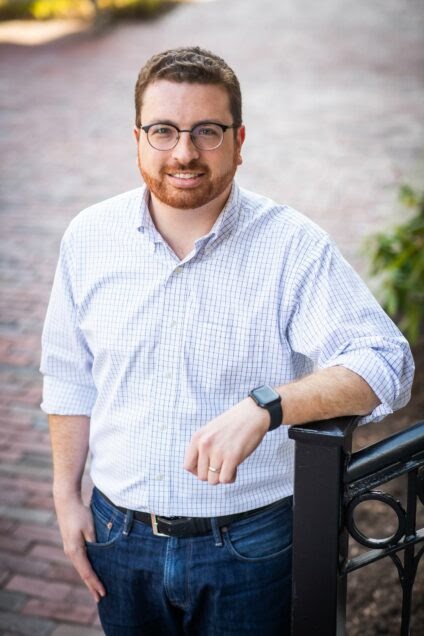Faculty Friday: Maxwell Palmer
Faculty Friday is a series highlighting members of the Initiative on Cities (IOC) Faculty Advisory Board, by exploring their work on campus and in the city. This week, we are highlighting Maxwell Palmer, Assistant Professor of Political Science at the College of Arts and Sciences, and an IOC Faculty Fellow.
By Claudia Chiappa
This is Maxwell Palmer’s seventh year at Boston University. His research focuses on American politics, with an emphasis on political institutions and structures. Palmer’s areas of focus include local politics and housing development, the return value of running for office, and redistricting plans. His research also includes work on voting rights and voting access.
COVID-19 and Urban Housing

Last spring, Palmer received an IOC COVID-19 Urban Research-to-Action grant, which support new research on the disproportionate impacts the COVID-19 pandemic has on marginalized urban residents. Palmer collaborated with Associate Professor Katherine Levine Einstein and a team of undergraduate students to look at the effect of COVID-19 on the housing crisis, especially on cities. The project collected data from several cities across the U.S. and explored the housing policies implemented in response to the COVID-19 outbreak in order to understand both what programs were implemented, as well as their impact on those at risk of losing their homes. In October, the IOC published a report outlining their findings.
“The biggest takeaway is that cities are trying to take action to avoid this crisis or help mitigate it, but they need more funding,” noted Palmer. “It highlighted the lack of federal action that was necessary to help cities afford the programs they needed to do to reduce the impact of COVID and avoid a greater housing crisis.”
Programs put in place by cities often run out of money quickly, and only the federal government can offer the kind of funds they need. The study found that 45 states and 56% of large cities implemented some form of an eviction moratorium, which prevented people from getting evicted from their homes. However, the duration of such programs have varied significantly.
“We also looked at how quickly cities and states took action,” said Palmer. “Others lagged behind.”
The Menino Survey of Mayors
Palmer is also a co-principal investigator of the Menino Survey of Mayors. The 2020 Menino Survey will be released throughout the academic year and explores mayoral views on the 2020 census, the COVID-19 crisis, policing and protests, and greenspace.
A Menino Survey report published in September examines the U.S. census and how mayors engage with the census process to ensure their cities are accurately counted. Despite all the new challenges to conducting an accurate census created by the pandemic, Palmer noted how mayors were “hyper aware” of its importance.
“This matters for two major reasons. The first is representation,” explained Palmer. “Our census counts are really important in figuring how many congressional districts a state gets. If your city is undercounted, that can reduce your representation in Congress or in state legislatures.” Representation of individual neighborhoods is also closely related to an accurate census because if a specific neighborhood is undercounted the people living there will be underrepresented.
“The second reason is because of funding,” noted Palmer. “The more people you have, the more money you can get, for any program. Mayors are really aware of the financial costs of being undercounted.”
Palmer explained that another interesting finding was how carefully mayors were looking at data on participation rates provided by the Census Bureau. Mayors paid close attention to which neighborhoods were participating and targeted the areas that were behind.
“The census only happens every ten year, this is our only shot for this decade,” said Palmer.
Voting rights
A substantial part of Palmer’s research focuses on voting rights, in particular at the national level. One study he conducted looks at how people who have access to a car can more easily access polls. Collaborating with Justin de Benedictis-Kessner, a professor at the Kennedy School of Government at Harvard University, Palmer looked at data from Michigan, matching each voter to driver license records and car registration databases.
“We found there was a huge negative effect of lacking access to a car on voting,” noted Palmer. “Lacking transportation really depresses the election day turnout for those people who don’t have a car.” According to Palmer, these findings make a strong argument for extending early voting and expanding access to absentee and mail-in voting.
Another study conducted by Palmer on voting rights focuses on redistricting, and ways to draw maps to avoid partisan gerrymandering.
Housing Policies and Participation
Last year, Palmer, Katherine Einstein, and David Glick published Neighborhood Defenders: Participatory Politics and America’s Housing Crisis. An examination of housing policies, the book examines who participates in local meetings and how that affects what housing gets built, among other topics. In particular, the focus is on the Boston area and Massachusetts, but Palmer said the findings apply nationwide.
“What we found is that the people who show up at planning and zoning board meetings are disproportionately homeowners, they tend to be whiter than the population as a whole, and older,” said Palmer. “They are often very much against any new housing.” Because planning and zoning meetings are an important step in the creation of new, affordable housing in desirable neighborhoods, it is vital that those participating more accurately reflect the communities affected.
Looking ahead, Palmer and his colleagues are working on a follow-up project examining how the transition of meetings to a virtual format may change the participation process by examining data before and after the start of the pandemic. Palmer believes that virtual meetings may remove many of the obstacles that prevented many from attending meetings in person.